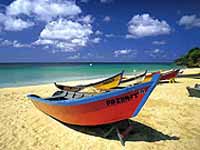Visit worldtravels.com for the full guide to Puerto Rico. Build a complete Puerto Rico travel guide and email to your clients - sign up for a trial subscription of World Travels Pro.
Puerto Rico

Puerto Rico is a Caribbean island with a difference. It has the pristine beaches, tropical climate, crystal-blue sea and coconut palms characteristic of its counterparts; but along with its unmistakable Spanish colonial heritage, the island today is also part of the United States Commonwealth, meaning it has a first-world infrastructure mixed in with its traditional Latin American culture. Hamburgers are as endemic as island dishes like sancocho, and freeways connect shantytowns to strips of high-rise beachfront hotels. The second thing that makes Puerto Rico different to other Caribbean holiday Meccas is that it remains largely undeveloped, except for the coastal region around its capital city, San Juan. The island is edged with some magnificent beaches that are mostly uncommercialised, and which are easily reached from the capital and its large resort hotels because the island is so small and compact.
Exploring Puerto Rico, both around its coast and throughout its interior, is a delight. Roads are excellent and there are numerous interesting attractions and unrivalled experiences, from the world's largest radio telescope to the magical experience of swimming at night amongst tiny phosphorescent creatures on the offshore island of Vieques.
Historically Puerto Rico, like many other Caribbean islands, was originally inhabited by Taino Indians until the arrival of Christopher Columbus and the instigation of Spanish rule and settlement. The island's capital and larger towns have preserved their Spanish heritage as 'old quarter' tourist attractions, full of charm and interest. Puerto Rico is a hybrid of old and new which makes it an intriguing cultural destination, rather than just another tropical island paradise.
Climate
Puerto Rico enjoys a warm, tropical climate with temperatures of around 82ºF (27ºC) throughout the year. The temperature in the south is usually a few degrees higher than the north and temperatures in the central interior mountains are always cooler than the rest of the island. The dry season is usually from November to May but short showers can be expected throughout the year. The hurricane season is between June and November, but generally there is plenty of warning.
Money
The United States Dollar (USD) is the unit of currency, which is divided into 100 cents. It is often referred to as the 'peso' in Puerto Rico. ATMs and bureaux de change are freely available and all major credit cards and travellers cheques are generally accepted. Banking hours are 9am to 3.30pm.
Passport Visa
All passport holders must have an onward or return ticket and documents necessary for further travel. Entry requirements for Puerto Rico are the same as for the United States of America. When arriving from mainland USA there is no immigration control. It is highly recommended that passports have at least six months validity remaining after your intended date of departure from your travel destination. Immigration officials often apply different rules to those stated by travel agents and official sources.
Entry Requirements
- Valid passport or passport replacing documents are required. Visa not required.
- UK passport holders require a valid passport for travel to Puerto Rico. No visa is required, except for a maximum stay of 90 days for passports endorsed British Citizen. No visa is required for citizens of the British Overseas Territory of Bermuda.
- Canadian citizens require a valid passport. No visa is required.
- Australian citizens require a valid passport to enter Puerto Rico. A visa is not required for stays of up to 90 days.
- South Africans must hold a passport valid at the date of entry; a visa is also required.
- A valid passport is required. No visa is required for stays of up to 90 days.
- New Zealand nationals require a valid passport to enter Puerto Rico. A visa is not required for stays up to 90 days.
Health
There are no vaccination certificates required for travel to Puerto Rico, but travellers are advised to be up to date with routine vaccinations. Cases of dengue fever occur annually and mosquito protection measures are essential. Schistosomiasis is endemic and swimming in lakes, rivers and streams should be avoided. It is best to drink bottled water to avoid stomach upsets. Thoroughly wash or peel produce you buy in markets before eating it. Medical services are good but can be expensive; medical insurance is advised.
Embassy Consulates
- United States Embassy, London, United Kingdom: +44 (0)20 7499 9000.
- United States Embassy, Ottawa, Canada: +1 613 238 5335.
- United States Embassy, Canberra, Australia: +61 (0)2 6214 5600.
- United States Embassy, Pretoria, South Africa: +27 (0)12 431 4000.
- United States Embassy, Dublin, Ireland: +353 (0)1 668 8777.
- United States Embassy, Wellington, New Zealand: +64 (0)4 462 6000.
Foreign Embassies
- British Consulate, San Juan: +1 787 850 2400.
- Canadian Embassy, Washington DC, United States (also responsible for Puerto Rico): +1 (202) 682 1740.
- Australian Embassy, Washington DC, United States (also responsible for Puerto Rico): +1 202 797 3000.
- South African Embassy, Washington DC, United States (also responsible for Puerto Rico): +1 202 232 4400.
- Irish Embassy, Washington DC, United States (also responsible for Puerto Rico): +1 202 462 3939.
- New Zealand Embassy, Washington DC, United States (also responsible for Puerto Rico): +1 202 328 4800.







